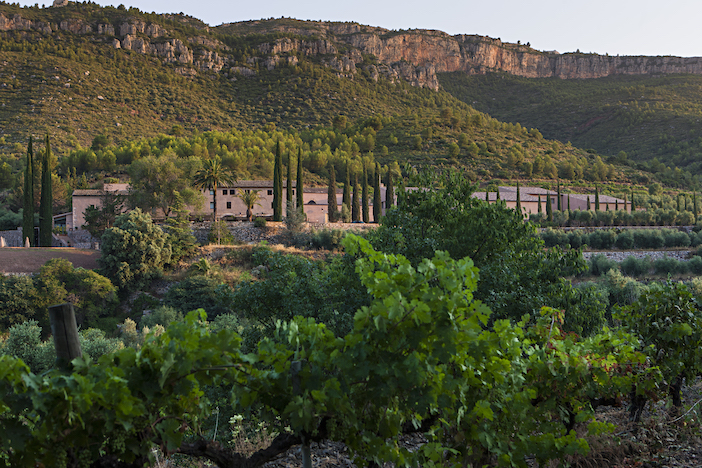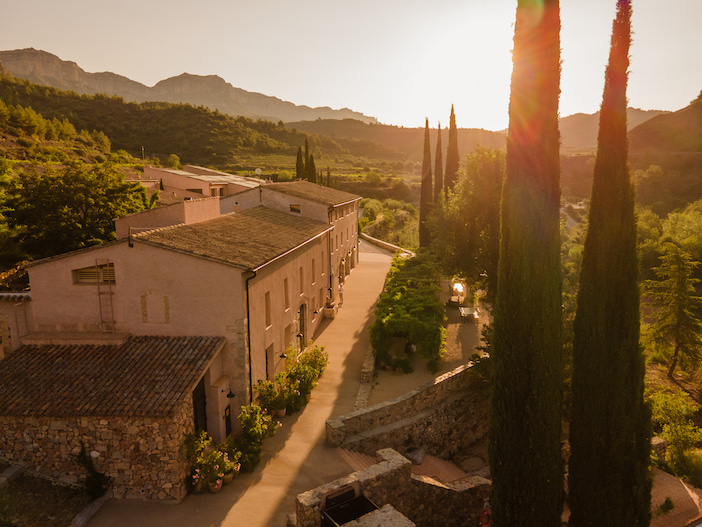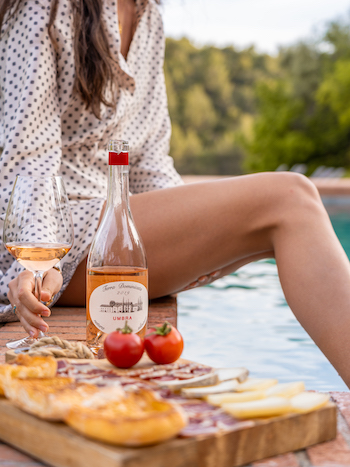Brits are familiar with many of Spain’s finest wines. Perhaps the best known is one of the country’s two DOC wines, Rioja. Spain’s other DOC wine – or DOQ, to be precise, because here we are in Catalonia – most of us are far less likely to have heard of, let alone tried. Priorat wines are grown not far from the Penedes region famed for its Cava. The landscape here, though, is very different from the rolling countryside of Penedes. The mountains of El Priorat are higher and wilder, their steep, black sides carved into terraces for olive groves and vineyards.
It’s a place where vines have to dig deep for sustenance because the Montsant mountains of this region are hard black slate. The resulting wines are robust and mineral rich, especially the reds, but even the white wines here have a similar strength, both in flavour and indeed in their alcohol level (usually around 14%). Their history is a long one.

The Romans were, of course, here first planting vines and making wine in the region around the second city of their empire, Tarragona. The region’s modern (as it were) vineyards really got going at the end of the 12th century when – not uncommon in these parts – there was a miracle. A shepherd saw a group of angels on a Cartoxia Scala Dei (stairway to God) and a priory (priorat) was built here by Carthusian monks who went on to create a feudal system of viticulture. Their demesne covered a vast area and much of that is now a national park. Imagine, then, the difficulty if you want to create not just a vineyard that is open to visitors but a hotel with the double planning safeguards of national park and historic buildings.
This then was the challenge faced at Terra Dominicata eight years ago. Their buildings dated back around half a millennium, some in quite good condition given the previous owners had restored them as the caves where the wine would be produced and stored. Others, though, were pretty much ruins, the homes of the farmers who had looked after the vineyards in the Middle Ages. It is hard to believe that now.

Terra Dominicata is so hidden that, after the twisting roads through the mountains, you come across it suddenly. In a deep natural basin, it’s surrounded by its vineyards, olive groves and tall cypress trees, all conspiring to produce a symmetry and sense of tranquility. There’s an outdoor spa, a lovely swimming pool, a vast terrace, part of the excellent restaurant and a spot to have a glass of wine (their own naturally) before dinner. You can go to a yoga class among the olive trees and walk or cycle for miles through the national park. This is the recommended form of exercise – they don’t have a gym. The bedrooms are vast with dressing rooms, stylish bathrooms and sitting rooms filled with books. Don’t, though, expect a television. One of the underlying concepts here is that it is quiet, you have time for reflection and sleep.
 There is, too, the wine. So you can go on a wine tour and discover the wines in depth at a tasting. In the restaurant the wines are all from the region and there’s plenty of advice from the Maitre D. You can visit Dominicata’s sister vineyard just a short drive away but also from here go on to explore the region from the historic city of Tarragona to the nearby village of Siurana, the last stronghold of the Moors in Catalonia.
There is, too, the wine. So you can go on a wine tour and discover the wines in depth at a tasting. In the restaurant the wines are all from the region and there’s plenty of advice from the Maitre D. You can visit Dominicata’s sister vineyard just a short drive away but also from here go on to explore the region from the historic city of Tarragona to the nearby village of Siurana, the last stronghold of the Moors in Catalonia.
Legend has it that Abdelazaia, the Moorish Queen, decided to avoid falling into the hands of the Christians by riding her horse (pure white, of course) over the cliff where the animal stalled, terrified, leaving an imprint of his horseshoe on the rock. With its jaw-dropping views, stone houses and cobbled streets filled with roses it’s hardly surprising that Siurana was recently invited to join the list of Spain’s most beautiful villages. They declined, not being too keen on the idea of being overrun with visitors. Very sensible. Don’t tell them I told you.
For more information about Terra Dominicata, please visit en.terradominicata.com. You can combine a stay at Terra Dominicata with a few days in Barcelona and drive through an extraordinary landscape stopping off to visit other vineyards and sights along the way with Pura Aventura’s Barcelona & Catalan Wine Route . From £1,850pp based on 2 sharing, including 7 nights’ B&B accommodation, 1 dinner, car hire, guided activities (e-bike tour, Gaudi house night visit, x3 winery tours, Montserrat visit and private transfers). International travel is extra – flight and rail options are available.
Photos by Eric Dherouville




